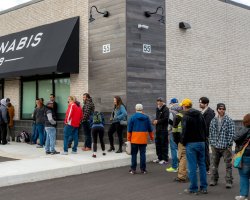More States Move to Legalize Cannabis

Voters in Arizona, Montana, New Jersey, and South Dakota legalized recreational marijuana, and voters in Mississippi approved its use for medicinal purposes. What does it mean when more than 35 percent of the American population now has access to legal cannabis? When 15 states have legalized a drug with proven, harmful effects? Furthermore, what does it mean when historically red states, states that have traditionally criminalized drug possession quite harshly, are now legalizing cannabis for medicinal and recreational use?
The recent election is showing us that public opinion is shifting significantly on marijuana. And as public opinion in several states shifts enough that pro-legalization ballot measures are passed in those states, populations in other states begin to warm to the idea of legalizing cannabis as well.
All of this is concerning because marijuana is harmful, whether people understand and are aware of its harm or not.
The November 2020 Election and Drug-Related Ballot Measures
One of the most notable aspects of the November 2020 election was that, of the eight significant, statewide ballot initiatives regarding drugs, all eight initiatives passed. Four of them were to legalize cannabis for recreational use. Others had to do with decriminalization of drug possession, as in the case of Oregon, where possession of small amounts of all drugs was decriminalized.
As a result of the November election, about 35 percent of the U.S. population now live in states that have legalized cannabis for recreational use (that's 15 states all in all). Another 20 states have legalized marijuana for medicinal use. Only 15 states still outlaw marijuana in any form.
The states which recently passed ballot initiatives legalizing recreational use are:
- Arizona
- Montana
- New Jersey
- South Dakota
And in addition to those four states, Mississippi also legalized cannabis for medicinal use.
Oregon passed a slew of initiatives regarding drugs, including legalizing psilocybin for medicinal purposes. Oregon also passed a decriminalization initiative, mentioned earlier, so if users get caught with small amounts of cocaine, fentanyl, heroin, OxyContin, or other hard drugs, they will have the choice to receive a fine or attend treatment.
In Washington D.C., voters decided to make drug-related arrests on the lowest level of priority for D.C. police officers. The result will not be total decriminalization, but it is very close to it.
Decriminalization and Legalization

It’s important to note that the above ballot initiatives are not all addressing the drug issue from the same angle. For example, “Legalization” and “Decriminalization” are very, very different approaches.
On the one hand, decriminalization addresses the drug problem from a demand-side perspective. Decriminalization is essentially an effort to admit that addiction is not a criminal decision but a severe health problem and personal crisis. Decriminalization can have beneficial results if and only if addicts are offered increased access to addiction treatment services.
Legalization, on the other hand, approaches the drug issue from a supply-side stance. Legalization essentially means that drugs, as a separate item from addiction, are OK and should be accessible. Legalization is very different from decriminalization because legalization goes so far as to contend that all drug use is okay (hence allowing for increased access to the supply of drugs, the supply of drugs now being legal). In contrast, decriminalization still posits that drugs are harmful and should be avoided, but addicts should not be punished for their crises.
In a November 17th NPR On Point podcast report that covered the above issues, NPR’s Meghna Chakrabarti put it quite succinctly:
"Wherever the War on Drugs was on the ballot, the War on Drugs lost."
Legalization Reduces Perceived Harm
The effect of more states move to legalize cannabis is that of reducing perceived harm. If residents in one state observe that their neighbors in the next state over have legalized cannabis, they may begin to ask themselves, “What’s so bad about marijuana, anyway?” We see this proven out in the fact that several states that legalized cannabis for recreational purposes in this past election were red states, i.e., states that traditionally would implement heavy-handed, War-On-Drugs era policy measures on any form of drug possession or use.
But all of that is changing now. Quoting Robert Mikos, professor of law at Vanderbilt University and an expert on marijuana law and policy, “There’s been building momentum towards this. A change in attitudes is what's driving legalization, and it's interesting about why people view this drug more positively today than 50 years ago.”
Across the country, more and more Americans are beginning to see marijuana as “safe.” This is dangerous because marijuana is not safe. Not in the slightest. Marijuana has a slew of adverse side effects, and it has the potential for causing long-term harm.
Addiction Treatment—What to Do if Your Loved One is Using Drugs

The argument for decriminalization has some sense to it. Quoting the Drug Policy Alliance and an open letter they put together with the help of more than 100 researchers, academics, clinicians and public health organizations, "Although marijuana arrests do not always result in incarceration; police contact, arrests, and drug convictions can carry significant collateral consequences that can place health and wellbeing at risk … ineligibility for social services including public housing, restricted employment opportunities, ineligibility for federal financial aid, and denial of voting rights."
So yes, decriminalization has some merit from a certain angle, but only if addicts who would ordinarily have been arrested and thrown into the criminal justice system are instead treated. Decriminalization does not work unless addicts are offered better access to addiction treatment; unless it is insisted that they avail themselves of treatment services.
Marijuana does cause harm, and people can become addicted to it. Remember, the marijuana of today is far more potent than it was even just two decades ago. As more states legalize marijuana, and as more people see the drug as having less inherent risk in its use, more people will begin using it. If you know someone who has become addicted to marijuana (or any other drug for that matter), make sure they get help via a drug and alcohol rehab center.
Sources:
- https://www.npr.org/podcasts/510053/on-point
- https://www.theguardian.com/us-news/2020/nov/14/marijuana-legalization-us-elections-2020
- https://drugpolicy.org/MORE-PublicHealth


 ®
®